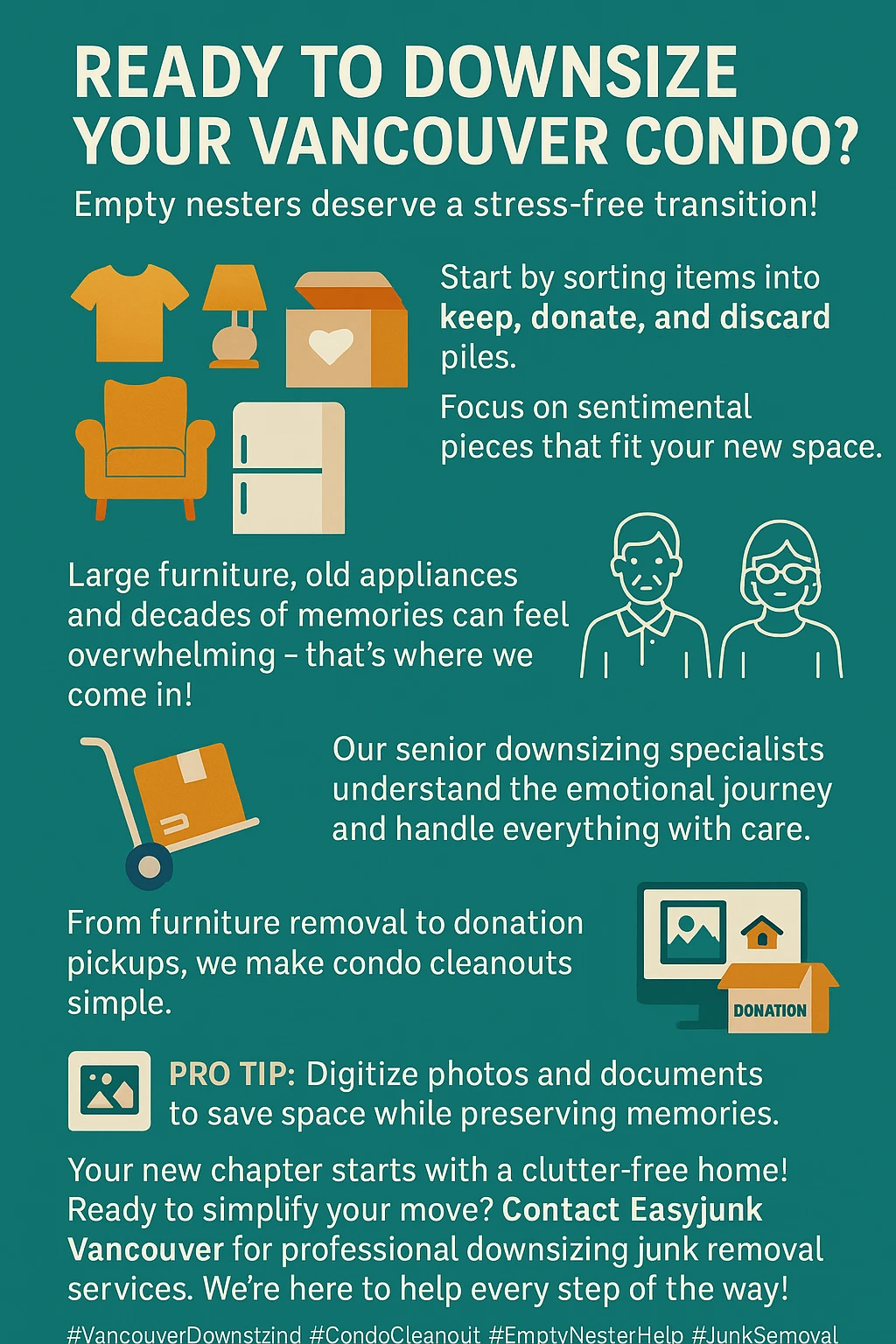Vancouver Condo Downsizing: Essential Junk Removal Tips for Empty Nesters
Ready to trade your family-sized Vancouver home for a sleek downtown condo but feeling overwhelmed by decades of accumulated belongings? You’re not alone – thousands of empty nesters are discovering that strategic junk removal is the secret weapon for successful condo downsizing in one of Canada’s most expensive housing markets.
Vancouver’s real estate landscape presents unique opportunities for empty nesters considering a move to condo living. With condo prices dropping 8% in recent months and over 3,000 new apartment completions creating more inventory, the timing couldn’t be better for downsizing. However, transitioning from a spacious family home to a compact condo requires more than just finding the right property – it demands a comprehensive approach to decluttering and junk removal that many homeowners underestimate.
The challenges of condo downsizing in Vancouver go beyond simply fitting your belongings into a smaller space. From navigating strict building regulations for item removal to maximizing every square foot of your new home, successful downsizing requires careful planning, strategic decision-making, and often professional assistance. This guide will walk you through essential junk removal tips specifically tailored for Vancouver’s condo market, helping you transform what could be an overwhelming process into an exciting new chapter of simplified living.
Key Outtakes:
- Over 33% of Canadians struggle with household financial needs, making downsizing a practical necessity for many Vancouver empty nesters seeking financial relief and simpler living arrangements.
- Professional junk removal services can recycle up to 60% of items during condo cleanouts, supporting Vancouver’s environmental goals while reducing landfill waste.
- Strategic timing of your condo downsizing can save thousands in Vancouver’s volatile real estate market, with current conditions favoring buyers over sellers.
- Proper space planning and decluttering techniques can make a small condo feel 40% larger through effective organization and multi-functional furniture choices.
- Empty nesters can unlock substantial equity by downsizing, with Vancouver condo prices creating new opportunities for strategic property transitions.

Understanding Vancouver’s Condo Downsizing Market for Empty Nesters

The landscape for condo downsizing in Vancouver has shifted dramatically, creating unprecedented opportunities for empty nesters ready to embrace a simpler lifestyle. Recent market data reveals that condo prices fell 8% compared to the previous year, while new apartment completions nearly doubled, providing more inventory options than we’ve seen in years. This market correction means empty nesters can finally find quality condos at more reasonable prices while potentially maximizing the sale value of their family homes.
Statistics reveal the broader context driving these downsizing decisions. More than one-third of Canadians report difficulty meeting their household financial needs, making the transition from expensive family homes to efficient condos not just a lifestyle choice but a financial necessity. Baby boomers, who own more homes than any other generation, are increasingly recognizing that their large properties have become financial burdens rather than assets. The maintenance, property taxes, and utility costs of sprawling Vancouver homes often consume retirement budgets that could be better allocated toward travel, healthcare, or simply enjoying life without the stress of constant home maintenance.
Vancouver’s unique geography and urban development patterns create specific advantages for condo living that appeal to empty nesters. Many newer developments offer proximity to healthcare facilities, public transportation, and cultural amenities that become increasingly important as we age. The ability to walk to restaurants, medical appointments, and entertainment venues represents a quality of life improvement that many downsizers find more valuable than extra bedrooms they no longer need. Additionally, Vancouver’s mild climate allows for year-round outdoor activities and socializing, making smaller indoor spaces more acceptable when balanced with accessible outdoor recreation.
What sets Vancouver apart from other downsizing markets is the seasonal timing strategies that can optimize your transition. While the mild Pacific Northwest climate allows for moves throughout the year, spring and fall typically offer the best conditions for major decluttering projects and junk removal services. Summer months see increased competition for moving services and higher costs, while winter weather can complicate outdoor item removal and donation pickups. Smart empty nesters plan their downsizing timeline around these seasonal factors to minimize costs and maximize convenience.
The emotional and social aspects of Vancouver condo downsizing deserve equal consideration alongside financial factors. Many empty nesters discover that condo communities offer built-in social networks and shared amenities that replace the isolation that can accompany large suburban homes. Building amenities like fitness centers, gardens, and community rooms provide opportunities for connection and activities without the responsibility of maintenance. This community aspect often surprises downsizers who initially worry about losing privacy, as they find the balance between independence and social connection perfectly suited to their empty nester lifestyle.
Pre-Downsizing Planning and Assessment

Successful condo downsizing begins long before you start packing boxes or calling junk removal services. The foundation of a smooth transition lies in thorough planning and realistic assessment of both your current belongings and your future living space. Professional organizers consistently emphasize that measuring and cataloguing your new condo space represents the most critical first step in the downsizing process.
Start your assessment by taking detailed photographs and measurements of every storage area in your potential new condo, including kitchen cupboards, closets, pantry spaces, and living areas. Vancouver’s newer condo developments often feature expansive windows that flood units with natural light but may reduce available wall space for furniture and artwork. Understanding these spatial constraints before you commit to a property helps you make informed decisions about which belongings can realistically accompany you to your new home. Create a scaled drawing or use smartphone apps that help visualize how your current furniture will fit in the new space.
Once you have accurate measurements of your new space, implement the green painter’s tape strategy that professional organizers swear by. Mark equivalent storage and living spaces in your current home using tape to create visual boundaries that match your new condo’s dimensions. This exercise often provides the reality check that empty nesters need – seeing how much of their current belongings simply won’t fit in their new space motivates more aggressive decluttering and helps prioritize which items deserve the limited available space.
Creating a comprehensive downsizing timeline prevents the last-minute panic that derails many well-intentioned moves. Professional moving consultants recommend establishing a six-month timeline that includes distinct phases for decluttering, selling your home, and securing your new condo. Break this timeline into manageable weekly goals: weeks 1-8 for initial decluttering and donations, weeks 9-16 for selling or giving away furniture and large items, weeks 17-20 for finalizing your condo purchase, and the final weeks for packing and moving coordination.
Vancouver’s condo buildings present unique logistical challenges that require advance planning. Most buildings have specific regulations governing moving hours, elevator reservations, and the types of commercial vehicles permitted in parkades. Some strata organizations require advance notice for large item removal and may restrict the use of building common areas for staging belongings during moves. Research these regulations early in your planning process and factor them into your junk removal and moving timeline. Contact the building management or strata council to understand their specific requirements and avoid costly delays or violations during your move.
Financial planning for your downsizing project should account for both obvious and hidden costs. While empty nesters often focus on the savings they’ll realize from selling their large homes, the upfront costs of professional junk removal, moving services, and potential storage fees can add up quickly. Create a detailed budget that includes estimates for donation pickup services, professional organizers, temporary storage if needed, and the various fees associated with condo purchases. Many downsizers find that investing in professional help during the decluttering phase actually saves money by preventing hasty decisions and reducing the volume of items that need to be moved or stored.
Essential Junk Removal Services for Condo Downsizing

Navigating the world of junk removal services becomes crucial when downsizing to a Vancouver condo, as the volume and variety of items you’ll need to dispose of can quickly overwhelm


